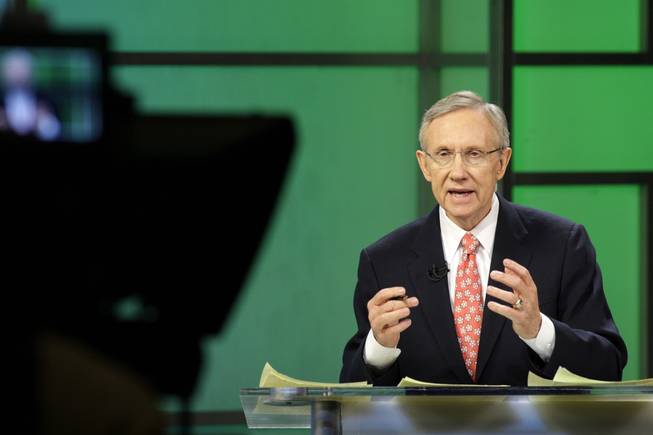
Senate Majority Leader Harry Reid, who is Mormon, responds to a question during a debate with Republican Sharron Angle in August 2010.
Wednesday, Sept. 5, 2012 | 2 a.m.
CHARLOTTE, N.C. — Mitt Romney’s candidacy has made Mormonism an issue in this election. But is it an issue around which to organize? Hardly.
The Latter-day Saints don’t rank as a voting bloc on the national stage like Hispanics, women or even evangelicals. To the extent that anyone even conceives of the LDS vote, it’s usually presumed to be Republican.
And in Nevada, Mormons are typically thought of as a voting bloc to cultivate only by Mormon candidates.
This year, some Democrats are trying to change that — at least on the national stage.
A group of Democrats from Western states, led by Utah, is trying to take advantage of the curiosity about Mormonism this year to raise the profile of those Latter-day Saints who vote Democrat — and convince the rest of the LDS community that according to their religion, they should do the same.
“We are not a Republican church,” said Scott Howell, a conservative Utah Democrat challenging Orrin Hatch for the Senate this year, who spoke Tuesday afternoon at a first-ever national event to promote Mormon Democrats. “I believe that I am a Democrat because of my faith, not in spite of it.”
Their job has been slow-going so far. Mormon Democrats are not particularly well-organized on the ground, or elsewhere. A Facebook group for Mormons supporting President Barack Obama in 2012 has just barely topped 1,000 members.
But enthusiasts are pretty sure there are about 1 million LDS church members out there who are Democrats, and most of them reside in swing states. They’re trying to reach them through the most prominent Mormon figures in their party, including Sen. Harry Reid.
“I didn’t know Mormons could be Democrats,” Reid said Tuesday of his own view when he was just getting started in politics. “Be proud of who you are. Don’t back down. Don’t be afraid of what your neighbors think. If you know you’re headed in the right direction … do everything you can in the next 10 weeks to help Barack Obama.”
But while LDS Democrats speak passionately and often emotionally about building their profile in the party, it’s not clear that this is an “historic moment” to make the Democratic Party pay attention to Mormon voters, or simply a chance to try to turn a few more votes in some critical states for the president.
Reid and Howell laid out their case for why conservative Mormons should convert to the Democratic Party, arguing that the LDS faith shares several basic tenets with the party, including respect for strong families, community service, education, humanitarian aid and good citizenship.
But their message was more focused on promoting Obama than on sowing seeds for building up a Democratic Mormon bloc over the long term.
“What a wonderful family man he is,” Reid said of Obama. “I’ve heard him in the most difficult situations, and I have never ever heard him swear an oath to anybody or about anybody. He’s not a foul-mouthed man.”
Most members of the Nevada delegation didn’t show up to the LDS event at the DNC Tuesday. The handful who did weren’t Mormon.
“Reid carried more [of the Mormon vote] than he should have in 2010,” said Nancy Kuhns, a guest with the Nevada delegation who came to the event. “I think Nevada’s so overly divided that every group is being targeted. I don’t think the message changes. I think people just like to know they matter.”
Nevada delegates interviewed Tuesday had no opinion on how to better reach Mormon voters, even though they acknowledged their importance in the Silver State. Mormons make up about 7 percent of the Nevada population, and vote heavily Republican.
Having a Mormon candidate at the top of the Republican ticket will only make it that much more difficult for Democrats hoping to win over the Mormon vote this year.
But some felt that even if winning over LDS voters was a longshot, the political circumstances make it worth trying.
“Harry didn’t win by that much. The president didn’t win by that much,” Kuhns said. “As close as everything is in Nevada ... they have to court every vote again.”

Join the Discussion:
Check this out for a full explanation of our conversion to the LiveFyre commenting system and instructions on how to sign up for an account.
Full comments policy